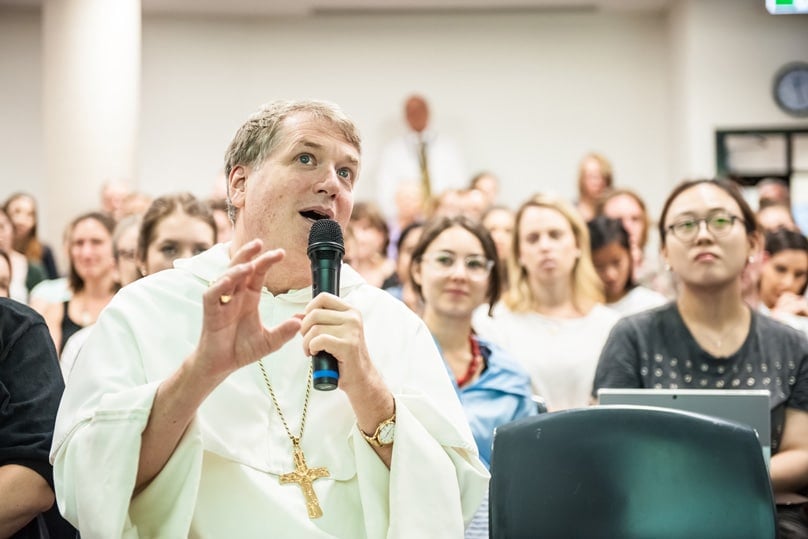 He’s not just a busy Australian archbishop dealing with a thousand-and-one daily issues to do with running an archdiocese; Archbishop Anthony Fisher OP is also an established academic in his own right – and he relishes the chance to get back into the classroom and teach whenever he can.
He’s not just a busy Australian archbishop dealing with a thousand-and-one daily issues to do with running an archdiocese; Archbishop Anthony Fisher OP is also an established academic in his own right – and he relishes the chance to get back into the classroom and teach whenever he can.
Last week he headed the line-up of prominent speakers at a bioethics program marking the launch of Notre Dame University’s Medicine Degree.
Archbishop Fisher, who is also Adjunct Professor of Bioethics at Notre Dame, is one of Australia’s best-known bioethicists and is internationally recognised for his contributions to writing, discussion and research on bioethical issues.
His expertise is part of the reason he serves as a member of the Church’s top doctrinal watchdog, the Congregation for the Doctrine of the Faith in Rome.
Last week he talked about moral and legal matters with the first-year medicine students, covering issues such as ‘The Dignity of the Person in Healthcare’, and ‘The Just Allocation of Resources’.
“I’ve always loved teaching so it was great to be back in the lecture theatre and to spend time with some of our doctors of the future,” Archbishop Fisher said.
“We had a lively discussion about the dignity of the human person and how we should allocate our health resources in health systems that are regularly said to be in ‘crisis’.”
He was joined by another world-class thinker, Professor Margaret Somerville AM, Head of Bioethics at the School of Medicine, Sydney.
Other UNDA staff who spoke with and to students were Professor Christine Bennett AO, Dean of Medicine, Associate Professor Janice Wiley, Head of Personal and Professional Development in the School of Medicine and Professor Sandra Lynch, Director of UNDA’s Institute for Ethics & Society.
Also participating were Dr Brigid McKenna, the Director of the Office of Life, Marriage & Family for the Archdiocese of Hobart and Associate Professor Bernadette Tobin, the Director of the Plunkett Centre for Ethics at Australian Catholic University.
“This is the first of six bioethics intensives for 2017 which form the basis of the bioethics unit embedded into the new MD, providing an excellent and essential foundation for our students’ careers as medical practitioners,” Professor Bennett said.
The MD replaces Notre Dame’s former Bachelor of Medicine / Bachelor of Surgery and, along with the additional emphasis on bioethics, incorporates a significant applied research-based or professionally-focused project to be presented and examined in final year.
“Ethics are integral to being a good doctor and must be embedded in all that you do as a doctor, they are not an add-on,” Professor Somerville told the inaugural MD cohort of 120 students.
“Having a basic knowledge about ethics is as important as having a basic knowledge about human anatomy or pharmacology or any other necessary part of medical practice,” Professor Somerville said.
“And that is why, on your first day in medical school, the University of Notre Dame starts your medical training with an intensive week of instruction in ethics. We want it to be and hope it will be a cornerstone, a deep foundation, of your future professional life as a doctor.”
Professor Somerville said the goal was not to teach students to be bioethicists, rather to give them a basic knowledge about bioethics, as everything they would do in medicine as a doctor would involve ethical considerations.
“That fact might not always be articulated or even consciously recognised, because what is ethical is so obvious and routine and everyone agrees about it. But sometimes, possibly often depending on the area of medicine in which you will practice, that is not the case.
“For instance, not everyone agrees about how aggressively you should treat a newborn premature baby, or when is it ethical to shut off life-support on a young, motor-cycle rider critically brain-injured in an accident, or whether you may ethically withhold IV food and fluids from an old person with advanced Alzheimer’s disease. And those are what we can call ‘everyday ethics’ issues.
“When we move to ‘avant-garde ethics’ issues, some presented by new science, especially genetics and molecular biology, and its immense powers to change the nature of Nature, including human nature, and other issues, such as euthanasia, thrown up by radical challenges to our foundational societal values; there can be open conflict as to what ethics should govern.
“So you need to have enough knowledge about ethics to be able to ‘do ethics’ in your practice of medicine and to defend the ethical stances that you believe are the right ones. We want to give you the knowledge and intellectual tools that you need to be able to do that.”
Notre Dame’s Doctor of Medicine is a four year graduate entry program accredited by the Australian Medical Council leading to medical practitioner registration, with graduates eligible for an internship in Australia.
During the first two years of the MD course the curriculum builds a solid foundation in the basic and clinical sciences and provides an introduction to the knowledge, skills and attributes required for clinical work as a medical professional. Clinical skills are taught from the first week and the course has a special focus on respect for human life, dignity and social justice. Aboriginal and Torres Strait Islander health and the importance of rural medical practices are areas of focus across the program.
In the final two years of the course students apply and develop their clinical skills and knowledge in the care of patients. Clinical placements in years three and four take place in a variety of hospital and community settings through one of Notre Dame’s Clinical Schools – engaging with patients, their families and the health care professionals caring for them.
